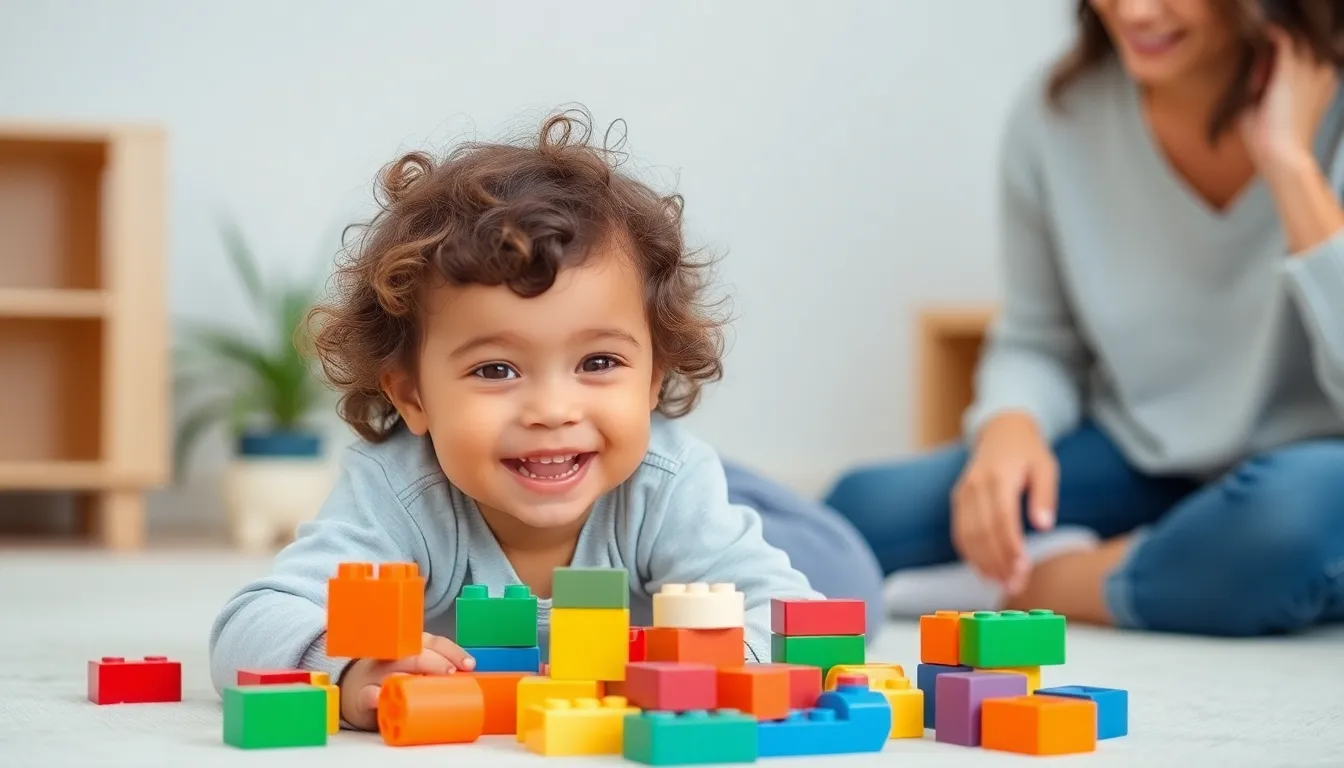Navigating the wild world of toddler discipline can feel like trying to tame a tiny tornado. One moment they’re adorably giggling, and the next, they’re testing the limits of your patience with a full-on meltdown. Every parent knows that discipline isn’t just about correcting behavior; it’s about teaching little ones how to navigate their emotions and the world around them.
But fear not! With the right strategies, parents can turn those chaotic moments into opportunities for growth. From gentle redirection to the occasional timeout, effective discipline can be both fun and educational. After all, who knew that turning a tantrum into a teachable moment could be so rewarding? Get ready to discover practical techniques that’ll help you maintain your sanity while raising a well-behaved little human.
Table of Contents
ToggleUnderstanding Toddler Discipline
Toddler discipline involves more than just correcting behavior. It focuses on guiding children through their emotions and experiences.
The Importance of Discipline in Early Childhood
Discipline shapes a child’s understanding of boundaries. It builds a foundation for self-control and social skills. Effective methods foster emotional intelligence. Children learn to express feelings and develop empathy. Consistency in discipline helps create a secure environment where toddlers thrive. Developing these skills early aids in future interactions and problem-solving.
Common Challenges in Toddler Discipline
Parents face various challenges in toddler discipline. Resistance to authority often leads to conflicts. Emotional outbursts can occur without warning. Frustration may arise from a toddler’s limited communication skills. Implementing strategies like positive reinforcement can be difficult amidst chaos. Maintaining patience proves essential when navigating these testing moments. Every parent experiences setbacks while learning what works best for their child.
Effective Discipline Strategies

Effective discipline strategies help guide toddlers in understanding their emotions and responses. Implementing structured approaches fosters a secure and nurturing environment.
Positive Reinforcement
Positive reinforcement encourages desired behavior through praise or rewards. Highlighting achievements promotes confidence, making toddlers more likely to repeat good actions. For example, offering verbal affirmations or small treats after positive behavior reinforces those actions. Engaging in lively praise emphasizes the fun of cooperation and understanding. Remember to be specific in acknowledgment, detailing what behavior merits reinforcement. Using consistent praise strengthens the connection between actions and rewards, effectively shaping future behavior.
Setting Clear Boundaries
Setting clear boundaries establishes rules toddlers can grasp easily. Communicating expectations in simple language ensures understanding and compliance. For instance, consistently enforcing “no running indoors” or “sharing toys” provides clarity. Using visual aids, like charts or pictures, can make boundaries more tangible for young minds. Always follow through on consequences to maintain trust. Reinforcing boundaries through routine helps toddlers internalize the meaning behind the rules. Parents provide stability and security by defining limits consistently, allowing toddlers to focus on exploring and learning within those parameters.
Approaches to Toddler Discipline
Effective toddler discipline strategies provide essential support in understanding emotions and behaviors. Several key methods help guide parents in creating positive outcomes.
Time-Out Technique
Time-out provides a brief break from overwhelming situations. This technique allows toddlers to calm down and reflect on their actions. Parents often choose a designated space, minimizing distractions. During time-out, toddlers learn about consequences in a safe environment. Consistent implementation enhances its effectiveness, encouraging children to connect their behavior with the need for a pause. Generally lasting one to five minutes, these sessions should match a child’s age. Communication after time-out reinforces feelings and appropriate responses, promoting emotional understanding.
Natural Consequences
Natural consequences arise from a child’s actions and can effectively reinforce learning. For instance, if a toddler refuses to wear a coat, they experience cold weather. This firsthand experience establishes a connection between choices and outcomes, fostering learning without parental intervention. Parents should focus on safety, ensuring consequences do not harm the child. Open discussions about these experiences build understanding and emotional intelligence. Encouraging reflections on choices helps toddlers comprehend the implications of their actions, guiding future behavior effectively.
Cultural Perspectives on Discipline
Cultural context shapes how discipline is approached. Different societies instill various methods based on values, beliefs, and traditions.
Differences in Approaches
Approaches to toddler discipline vary across cultures. In some cultures, strict discipline emphasizes obedience and respect for authority. Other cultures promote gentle discipline, focusing on communication and understanding. For instance, East Asian practices often prioritize group harmony and conformity, leading to more directive parenting styles. In contrast, Western cultures might stress individualism, encouraging self-expression and negotiation. These diverse methods impact how toddlers perceive boundaries and consequences.
Influences of Parenting Styles
Parenting styles play a crucial role in toddler discipline. Authoritative parents combine warmth with structure, fostering better emotional regulation in their children. Permissive parents may struggle to enforce limits, leading to confusion regarding expectations. In contrast, authoritarian parents often rely on control, which might yield compliance but can stifle emotional growth. Research shows that consistent practices, individualized to the child’s needs, enhance social and emotional development. Understanding these influences helps parents navigate disciplinary strategies within their cultural framework.
Toddler discipline is a vital aspect of early childhood development that shapes emotional intelligence and social skills. By implementing effective strategies like positive reinforcement and clear boundaries, parents can guide their children through the emotional whirlwind of this stage. It’s essential to remain patient and consistent while recognizing that every child is unique. Embracing the challenges and celebrating the small victories will foster a nurturing environment where toddlers can thrive. Ultimately, understanding and adapting discipline methods to fit individual needs will empower parents to raise well-rounded and emotionally aware children.
